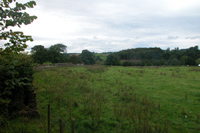 |
 |
 |
 |
 |
 |
 |
|
Fountains Abbey: History
Fountains Abbey: Buildings
|
Fountains under Abbot Richard (II) 1139-1143 (2/26) The death of Archbishop Thurstan in 1140 robbed Fountains of its patron and friend, and sparked off a bitter dispute that divided the country. The appointment of William FitzHerbert as Thurstan’s successor provoked considerable hostility from those who questioned the legitimacy and suitability of this appointment. Whilst Abbot Richard was not one to thrust himself to the forefront of political and ecclesiastical affairs, he and Abbot William of Rievaulx voiced their opposition to FitzHerbert’s appointment and joined the delegation to Rome in 1143, to see the pope. Fountains and Rievaulx were therefore embroiled in the ecclesiastical strife that divided the North of England. Richard’s reluctance preside as abbot never abated and on several occasions he pleaded with Bernard of Clairvaux to release him from what he considered a burden. Bernard finally conceded that Richard might resign from office if the monks of Fountains agreed to this. Unfortunately for Richard, the community did not want to lose its abbot and strongly opposed any such action. Furthermore, the monks feared that Richard’s departure would bring scandal to the abbey and provoke gossip - they would most certainly be accused of disobedience and Richard of weakness and fickleness. The monks’ concern with reputation is striking and even surprising, for we might expect that a community which sought seclusion from worldly affairs would have been less sensitive to the tittle-tattle of others and more sensitive to the needs of its abbot. By way of a compromise, the monks offered to take over Richard’s worldly duties, but they need not have worried, since Abbot Richard died later that year. En route to the General Chapter he stopped off at Clairvaux, and there ‘made a blessed end to his course and fell asleep in the Lord.’(42) |
